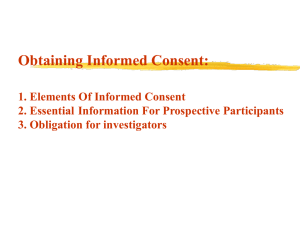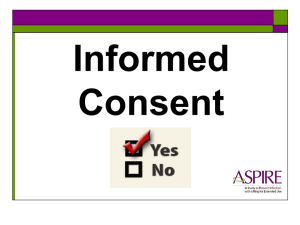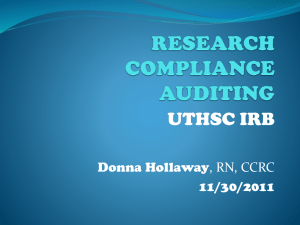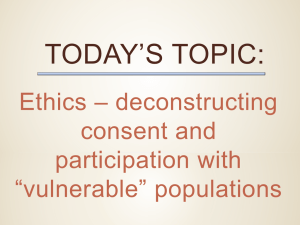Research Ethics lecture
advertisement
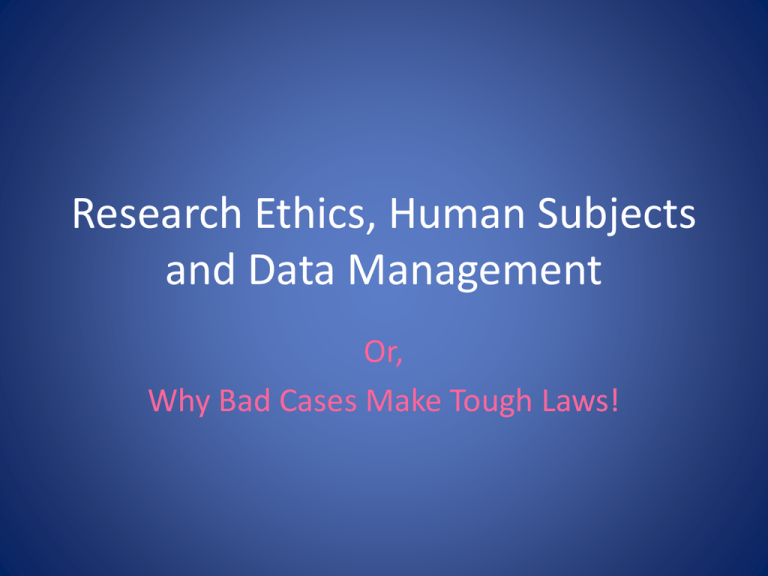
Research Ethics, Human Subjects and Data Management Or, Why Bad Cases Make Tough Laws! Objectives: By the end of this lecture.... • 1. You will have stopped wondering why there are so many conflicting results out there. 2. You will have stopped wondering why there are so many hoops to jump through in order to do research. 3. You will realize that the honest person has many blessings, not the least of which is that they don't have to keep track of what they lied about. 4. You will be able to assess whether someone else's research has been conducted in an ethical manner, and know how to go about planning and conducting ethical research yourself, with the appropriate guidance. History Lesson: • The Three Wonderful Universal Principles and How We Got Them History Lesson: • The Three Wonderful Universal Principles and How We Got Them • Respect for Persons • Beneficence • Justice • (Not to mention Integrity and Honesty) Classic Historical Examples of the Violation of All of the Above • Nazi Doctors in Concentration Camps • Tuskegee Syphilis Study - and Guatemala too!! 40's 70's • http://en.wikipedia.org/wiki/Unethical_human_experi mentation_in_the_United_States • Responses – Nuremberg Trials/Code - 1946-47 - voluntary participation, animals first, discontinue if harms to human subjects – Helsinki Declaration - 1964-2000 - Independent review required, qualifications required – Belmont Report - 1979- defining informed consent, noting ward patients were guinea pigs, private patients were beneficiaries – what principle is that again? _________ OK, this was bad. Really, Really Bad. So now… • All research must be approved by an IRB, and the IRB decides if your proposal is minimal risk, deidentified and confidential enough to be exempt. • It's actually quite a bit harder to do research with special populations now. • All researchers must be trained in ethics. (There are really nice online programs to get this done efficiently so you can get back to trying to write grants and get published.) What’s with all the hoops we have to jump through, and who’s holding them?? • Overheard in 1980-something re research on institutionalized kids: "I like to think...they're giving something back.“ • Title 45, Part 46 - Code of Federal Regulations (aka 45 CFR 46, The Protection of Human Subjects Regulations) – Outlines purpose and policies of Institutional Review Board (IRB) – Informed consent and protections for children, pregnant women, fetuses, prisoners, and mentally incompetent individuals. How far should you go with informed consent? • Comprehensive (ALL risks and benefits), voluntary, and competent • Pretty far – PGP had an online exam you have to ace before participation considered, including an essay question • Case from UW site: – Q: Mrs. Franklin, an 81-year-old Alzheimer's patient hospitalized under your care has been asked to participate in a clinical trial testing a new drug designed to help improve memory. You were present when the clinical investigator obtained a signed informed consent from Mrs. Franklin a few days ago. However, when you visit Mrs. Franklin today and ask her if she is ready to begin the study tomorrow, she looks at you blankly and seems to have no idea what you are talking about. – Now what? • Q: Mrs. Franklin, an 81-year-old Alzheimer's patient hospitalized under your care has been asked to participate in a clinical trial testing a new drug designed to help improve memory. You were present when the clinical investigator obtained a signed informed consent from Mrs. Franklin a few days ago. However, when you visit Mrs. Franklin today and ask her if she is ready to begin the study tomorrow, she looks at you blankly and seems to have no idea what you are talking about. • A: The competence of Mrs. Franklin to give an ethically valid informed consent is in doubt. You should contact the primary investigator to discuss Mrs. Franklin's participation in the trial. There may be a surrogate who can give consent for her participation if it is deemed to be in her best interests. Although she may be considered a vulnerable research subject because of her mental status, Mrs. Franklin does belong to the population the intervention is designed to assist, and her participation may benefit herself and other Alzheimer's patients. However, a careful balancing of risks and benefits should occur. Another one from UW • Q: After having completed a study that involved the collection of tissue from the subjects, an investigator wishes to perform additional analysis of the archived tissue samples. This nature of this analysis was not explicitly stated in the original consent form. Should the investigator be required to obtain explicit consent for the new research? [And, can you do a better job with the original consent in the future?] • Q: After having completed a study that involved the collection of tissue from the subjects, an investigator wishes to perform additional analysis of the archived tissue samples. This nature of this analysis was not explicitly stated in the original consent form. Should the investigator be required to obtain explicit consent for the new research? • A: Institutional Review Boards have increasingly required that explicit consent be obtained, if practical, before archived tissue can used for research. Archiving samples for an unspecified “future use” without explicit consent undermines the autonomy of the participants. Even if participants may be willing in general to have surplus tissue used for research purposes, they should still be asked for their consent. A Powerful Question • Q: You have limited funds and can just barely cover enrolment of enough subjects to adequately power your study. Can you explicitly require that subjects may not withdraw consent or have their data removed from the study database once they have provided the initial blood test sample and received results? • Q: You have limited funds and can just barely cover enrolment of enough subjects to adequately power your study. Can you explicitly require that subjects may not withdraw consent or have their data removed from the study database once they have provided the initial blood test sample and received results? • A: Well, no. As in nope, no way, uh-uh, forget it. If for any reason it would be impossible to do so, you are obligated to say so up front as well. Academic Dishonesty and The Pressure to Publish • With proper attribution built right in: barney-tobey-too-bad-about-oldainsworth-published-and-published-but-perished-all-th--new-yorkercartoon.jpg….BAD QOTD: “they can’t judge quality but they CAN count.” Axes To Grind Should Be Left Behind • • • • • • Fabrication of Data Plagiarism Conflict of Interest Phony/Honorary Authorship Unpublished Negative Results Misleading Lay Press Reports and Overinterpretation/Extrapolation – Example: Dr. Andrew Wakefield, http://www.theglobeandmail.com/life/parenting/youngchildren/children-health/article1867998.ece Authorship • One of the female pediatric physiatrists is desperate to get published and says, “Sure, you can come do research on my clinic patients – as long as you put my name on the paper!” • What if it’s the Dept. head instead? • And he is a successful current NIH grant holder? Sure, you can be a co-author… • Make substantial contributions AND – conception and design and/or – acquisition of data and/or – analysis and interpretation • Write or revise all or part or the article AND • Approve the final version of the entire article. • Acquisition of funding, collection of data, or general supervision of the research group, do not justify authorship [but may merit at least a nice acknowledgement.] – guidelines from www.icmje.org Ethics, Validity, and Applicability • Piper and Pless • The Anti-Antioxidant Paper • LESS research on this subject is urgently needed… – the worse disease is bad for you and costs more syndrome , unless validating a clinical scale – which is better versus what works for some if not all • Clinical practice versus research – What’s different between being a patient and being a subject? What’s the same? – What can you say to a patient who thinks you are making them your guinea pig? Assessing the Literature • What does the author conclude? • Do they present valid evidence for it? – If not, what CAN they validly conclude ? (the sympathetic reviewer’s question”) • Does it apply to my patient(s)? • Do others asking the same thing come up with the same answers? If not, why?? • (How) Do I need to change my practice? Additional Routes to Meaningful Research and Best Practice • • • • Inform of off-label use of anything Clinical Trials Registration COI Disclosure Consider community-based participatory research • http://www.achri.archildrens.org/resources /research_resources.htm • http://www.uams.edu/rsc/Resources.htm

